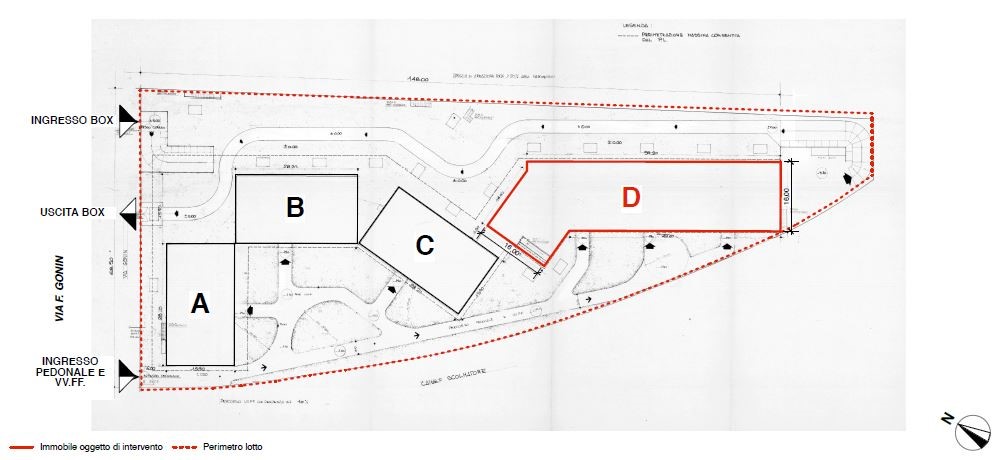AUTORE: Martina Milici
TUTOR: Alessandro Zichi, Giampiero Cantoni
INTERNSHIP: Evolve s.p.a
MASTER: Master in “Edifici ed Infrastrutture sostenibili” a.a 2019/20
La seguente tesi si configura come analisi e verifica di un progetto di fattibilità Superbonus 110% portato avanti da Evolve s.p.a. con l’aggiunta di un secondo scenario migliorativo. L’edificio preso come caso studio è sito in Milano, in via Gonin 65, edificio D.E.F. Esso è composto da 8 piani fuori terra, sette dei quali ospitano residenze, 9 per piano. Il Piano d’accesso, oltre agli androni con i servizi, ospita delle cantine.
A seguito di un primo sopralluogo è stato possibile raccogliere tutti i dati necessari ad impostare un’analisi di fattibilità energetica preliminare. L’edificio si configura con una struttura in c.a. composta da travi e pilastri.
Le tamponature sono in mattoni forati con intercapedine d’aria e coibentazione. La copertura è leggermente inclinata e non coibentata. Gli infissi sono in legno a doppio vetro e il sistema di riscaldamento invernale è di tipo autonomo, composto da caldaie tradizionali da circa 24kW cad.
Attraverso la modellazione energetica dello stato di fatto è emerso che l’edificio, allo stato attuale, risiede in classe energetica E con un indice di prestazione energetica globale pari a 112,95 kWh/mq.
Studiata la normativa relativa al Decreto Rilancio – Superbonus 110%, lo Scenario 1 ha scelto come intervento trainante la coibentazione delle pareti opache verticali con la conseguente correzione dei ponti termici, la coibentazione del sottotetto e il rifacimento della copertura.
Il primo scenario non è altro che la proposta progettuale portata in assemblea condominiale. A seguito della modellazione energetica, ne risulta che con gli interventi proposti si passa da una classe energetica E ad una classe energetica C con un indice di prestazione globale pari a 71,49 kWh/mq.
Viene così soddisfatto il requisito del salto delle due classi necessario all’ottenimento del Superbonus 110%. All’interno della tesi verranno esplicitate tutte le verifiche di legge necessarie all’ottenimento della detrazione. La suddetta proposta progettuale viene accettata in assemblea e a Gennaio 2021 parte il cantiere.
Lo Scenario 2, portato avanti per curiosità personale, ha voluto aggiungere all’intervento trainato dello Scenario 1, due interventi trainanti quali la sostituzione degli infissi e la sostituzione delle caldaie autonome.
Grazie all’installazione di infissi a triplo vetro e all’installazione di caldaie a condensazione di circa 10 kW (la riduzione di potenza è stata possibile grazie all’efficientamento del fabbricato dovuto al cappotto e agli infissi nuovi) si è passati da una classe energetica C ad un A2 con un indice di prestazione energetica pari a 32,79 kWh/mq.
FOR INTERNATIONAL STUDENTS:
The following thesis is based on the analysis and the verification of a feasibility project regarding the Superbonus 110% that Evolve s.p.a. carried on with the addition of a second improved proposal.
The building chosen as a case study is located in via Gonin 65, it consists of 8 floors above ground, seven of which are used for housing purposes including seven units per floor.
The ground floor houses the entrance, the services and the cellars.
Following an initial inspection, it was possible to collect all the data necessary to set up a preliminary energy feasibility analysis. The building is configured with a reinforced concrete structure composed of beams and pillars.
The infill panels are made of perforated bricks with an air gap and insulation. The roof is slightly inclined and not insulated. The windows are made of double-glazed wood and the winter heating system is autonomous, consisting of traditional boilers of about 24kW each.
Through the energy modeling of the state of affairs, it emerged that the building, at the present time, is ranked class E energy with an overall energy performance index of 112.95 kWh / sqm.
Having studied the legislation relating to the Relaunch Decree – Superbonus 110%, Scenario 1 has chosen the insulation of the opaque vertical walls with the consequent correction of thermal bridges, the insulation of the attic and the refurbishment of the roof as the driving intervention.
The first scenario is none other than the project proposal brought to the condominium assembly. Following the energy modeling, it results that with the proposed interventions there is a transit from a class E energy to a class C energy with an overall performance index of 71.49 kWh / sq m.
The requirement of the upgrade by two classes necessary to obtain the Superbonus 110% is thus satisfied. All the legal checks necessary to obtain the deduction will be explained within the thesis. The aforementioned project proposal is accepted at the meeting and the construction site starts in January 2021.
Scenario 2, carried out out of personal curiosity, wanted to add to the intervention driven by Scenario 1, two driving interventions such as the replacement of fixtures and the replacement of autonomous boilers.
Thanks to the installation of triple-glazed windows and the installation of condensing boilers of about 10 kW (the power reduction was possible thanks to the efficiency of the building due to the coat and the new fixtures), we have gone from a class C energy to A2 with an energy performance index of 32.79 kWh / sq m.
What I believed to be a single exercise turned out to be the mirror of the wishes of some condominiums who, in the condominium assembly, asked to proceed with the replacement of the fixtures and the boiler. Evolve assessed the request and gave the designer the green light to proceed with a variant in progress. I can therefore conclude that the thesis addressed is verified in all its parts and for this reason I am satisfied.




